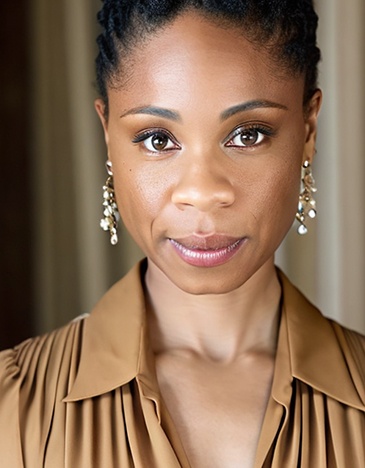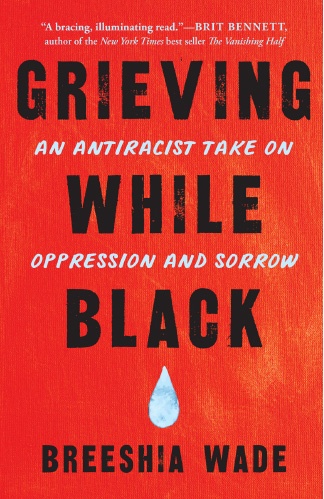
Breeshia Wade
SHE / HER / HERS
Breeshia Wade is the author of “Grieving While Black: An Antiracist take on Oppression and Sorrow,” rated as one of the best 9 books on grief and is one of the required reading in multiple university graduate courses. Her work is informed by her experience as a lay-ordained Zen Buddhist Chaplain employed by hospices and hospitals, and she has been featured in Reviewed: USA Today, Shondaland, Cosmopolitan, Fast Company, and more.
When advocating for social transformation, the unexplored fear of loss faced by those who are losing the benefits of privilege must be addressed to alleviate the grief of those who experience systemic oppression. Anti-racist work is grief work.
Popular Talks
Grieving White Privilege
Many White Americans expressly desire equity, but they haven’t come to terms with what they must lose, and grieve, for others to finally experience freedom.
The truth is that when talking about equity, people who’ve benefited from privilege have a lot to lose, which means that they have a lot to grieve.
Both the New York Times and Harvard Business Review have revealed that typical DE&I efforts spark anger and resentment in White employees. Subconscious fear of loss is often the source of that unspecified anger.
Moving through the grief of losing one’s norm so that Black people can experience safety, joy, financial security, non-biased medical treatment, and equitable access to education is necessary. Without doing this work, anti-racist efforts are not as effective.
The Grief Alchemy™ Fellowship Program for students
Grief Alchemy™ is a transformative training program designed for university students, offering a unique approach to addressing their relationship with grief and fear of loss. They will use their newfound self-awareness to develop a grief-informed framework for creating social change.
Upon successful completion, students become certified Grief Alchemists™, empowering them to train others in this compassionate approach.
Grief Alchemy™ prepares students to:
- Cultivate self-awareness, and enable students to embody the social transformation they desire to see in the world.
- Recognize personal influence and help fellow students understand how their being influences the effectiveness of their actions.
- Shift from action to being and guide other students from intellectualizing and theory to embodying social change.
Workshops
Grieving White Privilege
Many White Americans expressly desire equity, but they haven’t come to terms with what they must lose, and grieve, for others to experience freedom. This workshop supports White participants to move from theory to action by addressing the fear of loss associated with equity.
Beyond Anti-racism: Redesigning Human Identities
Humans have sought to oppress each other throughout time, so when systemic racism and White Supremacy are dismantled, another system will take its place.
This workshop focuses on redesigning cultural identities at their core. Participants will re-learn how they view themselves and other people, which sets the foundation for creating equitable relationships.
Grief-Informed Anti-racist Allyship Training Program
Interested in offering a transformative professional development opportunity to your employees? I create certification programs to enrich employees’ learning and foster long-lasting internal change.
“Her workshop at Stanford was powerful and full of insight. She’s a visionary who integrates her deep personal experience with broad academic and clinical training. I was so impressed that I asked her to co-facilitate a workshop.”
– Dr. Stephen Murphy Shigematsu, Professor, Stanford University
“I was very pleased. We appreciate complexity and nuance, which her work is full of, but I’m also impressed with her ability to clearly and compellingly communicate that complexity and nuance. That is a very rare ability. I’m greatly appreciative of that & value it highly!”
– Tim Fredrick, Managing Director of Education, Youth Communication
“This course articulately deconstructed power dynamics in different kinds of relationships. It also did a great job of succinctly but meaningfully outlining popular misconceptions of power and agency in a way that allowed me to focus on my personal and work relationships.”
– JM Ponce, Meta (Facebook)


Breeshia’s work is founded on Elemental Grief™, a model of grief that extends beyond concrete present or past loss, and includes fear of future loss.
When discussing grief tied to anti-Blackness, people focus on the sorrow experienced by those oppressed by White supremacy. Breeshia urges White people to reflect on how their unexplored fear of loss contributes to Black suffering.
Breeshia grew up 500 ft. from a cemetery outside, which sat outside of her bedroom window.
Her grandmother worked 12-hour shifts at a local factory to send Breeshia to a private school.
Breeshia was the only Black kid, and she suffered for it.
Her grandmother knew grief, and she saw Breeshia’s. It was the form of grief that forced her to choose which aspects of Breeshia’s identity to let die at the hands of White supremacy–and how–so that Breeshia’s education could lead to a future with enough time to stitch herself whole.
Breeshia’s upbringing shaped her grief-informed approach to DE&I, setting her on an educational and professional path focusing on the intersections of DE&I and grief.
She received her B.A. from Stanford University in Comparative Studies in Race and Ethnicity, and her M.A. in Religious Studies and Philosophy from the University of Chicago. She then completed a 2-year Buddhist Chaplaincy program at Upaya Zen Center, and became a lay-ordained chaplain in the Zen Buddhist tradition.
Post-education, she began working as a Buddhist chaplain in hospices and hospitals, where she saw how medical racism was the downstream effect of White staff’ Elemental Grief™, or fear of loss. For example, fear of being a “bad” person often prevented them from accepting the impact of their actions. She recognized that it was necessary to address White grief to minimize the impact of systemic racism.
Now, she works in “big tech,” where she continues to see how fear of loss plays out in interactions in the absence of impending death, from fear of losing respect to the fear of losing a job.
Her personal experiences, DE&I-centered education, grief training, and work in corporate America shape her grief-informed approach to DE&I training.
Let’s collaborate to ensure a transformative experience.

